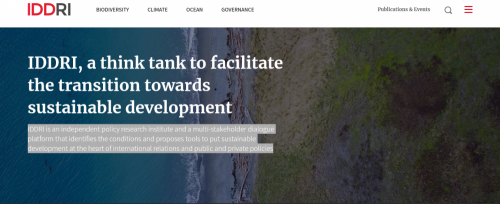
https://www.iddri.org/en/publications-and-events/policy-brief/review-hig...
FROM IDDRI: https://www.iddri.org/en/about-iddri
IDDRI is an independent policy research institute and a multi-stakeholder dialogue platform that identifies the conditions and proposes tools to put sustainable development at the heart of international relations and public and private policies
Key Messages
- The presentation of Voluntary National Reviews (VNRs) is a centerpiece of the HLPF and the number of countries willing to submit to the exercise is encouraging. However, several improvements could be made to reinforce accountability and increase the chances that this exercise actually helps driving additional national action, such as giving a peer reviewing role to civil society experts and other countries.
- Thematic and SDG reviews have been another central part of the HLPFs so far. The added value of these very general discussions with no actionable outcomes is limited. Instead, the HLPF could become the forum where intergovernmental organisations ask for dialogues on variables that lie beyond their mandate but that affect their respected area with the concerned entities. The HLPF could also take the initiative by organising such cross-sectoral dialogues around the transformations identified by the Global Sustainable Development Report.
- Dialogues will not be enough in the Decade of Action and Delivery. Therefore, the HLPF should also invite intergovernmental bodies to collaborate around cross-sectoral action plans in order to overcome obstacles in implementation that are due to the limited mandates of individual bodies and conventions. As an example, the HLPF is well positioned to address socio-economic issues and could invite the Convention on Biological Diversity and relevant other intergovernmental bodies to present joint multi-annual action plans, starting with two joint action plans on infrastructure and agriculture. Once these action plans adopted, the HLPF should then provide the space for following up on the progress made. Similar action plans could be launched for other off-track SDGs.
About the Authors:
Research Fellow, Governance and Financing of Sustainable Development
Elisabeth Hege
Damien Barchiche
Director of Sustainable Development Governance programme
Damien BARCHICHE heads the Sustainable Development Governance programme, which focuses on the official Sustainable Development Agenda - Agenda 2030, development financing, the trade agenda - but also on emerging modes of governance.
A graduate of Sciences Po Paris and CERDI, Damien has worked since 2006 in NGOs, at the United Nations and the Ministry of Europe and Foreign Affairs on sustainable development and governance issues, before joining IDDRI in 2018.
He was directly involved in the French presidency of the G20 and G8, the reform of the Committee on World Food Security, and initiatives to strengthen the coordination of international organizations (UN High Level Task Force on Global Food and Nutrition Security - HLTF). He was also France's focal point for the United Nations Convention to Combat Desertification (UNCCD) and the Intergovernmental Platform on Biodiversity and Ecosystem Services (IPBES).
Senior Advisor
Lucien Chabason
An expert on the OECD and UNEP, he is a member of the scientific councils of the Fonds Français pour l’Environnement Mondial (French Global Environment Facility) and the Prince Albert II of Monaco Foundation.
He was coordinator of the United Nations Mediterranean Action Plan (based in Athens) from 1994 to 2003. He led the Cabinet of the French Minister of the Environment, Brice Lalonde, then prepared the national environment plan from 1988 to 1992.
He was adviser to the French Prime Minister on environmental issues from 1976 to 1978, responsible for spatial planning issues, sites and landscapes at the Ministry of Environment (1978-1984), then director of the research department at the Ministry of Environment (1984-1988). He chaired the Plan Bleu, and founded and chaired the Association du Domaine du Rayol.
He studied law, sociology and political science before attending the Ecole Nationale d’Administration (1966- 1968).
He joined IDDRI in 2005.










Add new comment